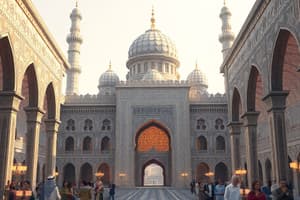Podcast
Questions and Answers
Apa yang menjadi faktor utama penyebaran Islam di Nusantara?
Apa yang menjadi faktor utama penyebaran Islam di Nusantara?
- Penduduk asli yang menolak agama Islam
- Penguasa lokal yang memaksakan agama Islam
- Penjajah Hindu dan Buddhisme
- Pedagang yang berani dari Lautan Hindia (correct)
Bagaimana dampak penyebaran Islam terhadap struktur politik di Nusantara?
Bagaimana dampak penyebaran Islam terhadap struktur politik di Nusantara?
- Penguasa lokal menjadi kejam terhadap non-Muslim
- Penguasa lokal melarang agama-agama lain selain Islam
- Penguasa lokal tertarik dengan manfaat spiritual dan strategis Islam (correct)
- Penguasa lokal semakin otoriter dalam memerintah
Apa yang menjadi dampak langsung dari penyebaran Islam terhadap arsitektur di Nusantara?
Apa yang menjadi dampak langsung dari penyebaran Islam terhadap arsitektur di Nusantara?
- Munculnya gereja-gereja baru
- Penurunan jumlah tempat ibadah
- Perkembangan masjid dan kramat (correct)
- Tidak ada pengaruh terhadap arsitektur
Bagaimana proses konversi agama di Nusantara pada masa tersebut?
Bagaimana proses konversi agama di Nusantara pada masa tersebut?
Apa yang dapat disimpulkan dari penolakan awal komunitas non-Muslim terhadap Islam di Nusantara?
Apa yang dapat disimpulkan dari penolakan awal komunitas non-Muslim terhadap Islam di Nusantara?
Apa yang menjadi salah satu hasil dari pengenalan Islam di Nusantara terkait ekonomi?
Apa yang menjadi salah satu hasil dari pengenalan Islam di Nusantara terkait ekonomi?
Apa yang dimaksud dengan 'pelataran' dalam konteks pendidikan di Nusantara setelah pengenalan Islam?
Apa yang dimaksud dengan 'pelataran' dalam konteks pendidikan di Nusantara setelah pengenalan Islam?
Bagaimana ulama di Nusantara mempengaruhi perkembangan sistem politik sehubungan dengan hukum syariah?
Bagaimana ulama di Nusantara mempengaruhi perkembangan sistem politik sehubungan dengan hukum syariah?
Apa yang menjadi ciri unik dari tradisi seni Wayang Kulit dalam konteks pengaruh Islam di Nusantara?
Apa yang menjadi ciri unik dari tradisi seni Wayang Kulit dalam konteks pengaruh Islam di Nusantara?
Apa dampak utama dari penyebaran Islam terhadap pertumbuhan ekonomi di Nusantara?
Apa dampak utama dari penyebaran Islam terhadap pertumbuhan ekonomi di Nusantara?
Flashcards are hidden until you start studying
Study Notes
Islamic Governance in Nusantara: A Historical Perspective
Nusantara is a vast archipelago encompassing modern Southeast Asia and its maritime borders, where various cultural influences intertwine, including those from Hinduism, Buddhism, Sikhism, Christianity, and most notably, Islam. This piece delves into the integral role Islam played throughout history in shaping governance, culture, economics, and social interactions within this region.
Spread of Islam
The earliest traces of Islam's presence in Nusantara can be traced back to the adventurous merchants who journeyed across the Indian Ocean between the seventh and ninth centuries CE, spreading their faith alongside their wares. As Islam asserted itself through these traders, local rulers became attracted to both the spiritual and strategic benefits it offered. By the thirteenth century, Muslim states had emerged along vital trading routes such as those linking India to China via Sumatra and Java. Conversion was usually voluntary rather than forced, often driven by individuals seeking integration into regional power structures. Despite initial resistance among non-Muslim communities, this gradual process led to a more diverse and religiously tolerant society in Nusantara.
Influence on Culture
As Islam gained prominence, so did its impact on regional cultures. For instance, architecture evolved with the emergence of mosques and kramats (tombs of saints), reflecting the growing importance of religious spaces. Likewise, Arabic script replaced indigenous scripts like Kawi in parts of Indonesia, leading to changes in written communication. Authoritative figures known as ulama (scholars) established schools called pelataran, fostering education based upon Quranic teachings and Islamic jurisprudence. Additionally, the arts reflected the convergence of traditional Javanese, Malay, and Islamic elements, resulting in unique syncretic traditions like Wayang Kulit puppetry.
Trade and Economy
The arrival of Muslims in Nusantara coincided with a period when maritime trade flourished. Merchants navigated the high seas, transporting luxury items such as spices, textiles, metals, and porcelain across vast distances. With the help of Islamic banking systems—such as waqf (charitable endowment), qard (loans), and zakat (taxes paid towards charity)—trade networks expanded exponentially amidst increasing commercial prosperity. Thus, the introduction of Islam led to economic growth and development across the entire region.
Political Structure
During periods of increased Islamization, Nusantaran societies witnessed the rise of new ruling elites. These groups, influenced by Sharia law, gradually adopted administrative principles promoting equity and justice while challenging existing autocratic feudal orders. This trend intensified during the reign of Sultanate dynasties found in areas such as Pasai (Sumatra), Melaka (Malaysia), Gresik (Java), and Demak (Central Java). Furthermore, the concept of Suluk (pacts or treaties) began to serve as a diplomatic tool among neighboring kingdoms, ensuring peaceful coexistence and preservation of the region's fragile balance of powers.
In conclusion, the expansion of Islam played a fundamental role in shaping Islamic governance in Nusantara. From its inception, this religion has profoundly affected regional politics, culture, societal norms, material goods exchange, and intellectual discourse, all of which continue to resonate today. Understanding the historical contexts and processes underpinning these transformations provides us valuable insights into the region's past and present, setting the stage for further exploration of contemporary issues and challenges facing Nusantara.
Studying That Suits You
Use AI to generate personalized quizzes and flashcards to suit your learning preferences.




